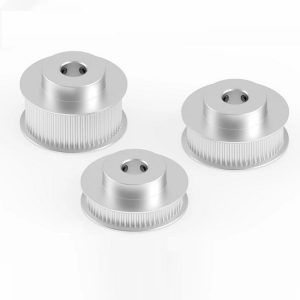The material you choose for CNC machining will depend on the desired application and end product. Common materials used for CNC machining include aluminum, brass, steel, plastic.
What are the specifics of different CNC materials?
CNC aluminum parts are typically lightweight, strong, and corrosion resistant. They are also easy to machine, meaning they don’t require a great deal of energy to cut or shape. Furthermore, aluminum has a high thermal conductivity, making it appropriate for heat sinks or components that need to dissipate heat. Additionally, CNC aluminum parts are aesthetically pleasing and can be anodized for further protection against corrosion.
CNC brass parts are highly machinable and non-corrosive, making them suitable for many applications. Additionally, brass is an excellent conductor of electricity and heat, making it ideal for electrical components and industrial applications. Brass is generally strong and durable, but can be susceptible to certain temperature and environmental conditions. Brass CNC parts also generally offer good appearance and are relatively easy to work with.
CNC plastic parts are lightweight, durable, and versatile, making them great for industrial and consumer applications. Plastics come in a variety of different shapes and sizes and are easy to machine. Plastics can also be modified to further customize their properties, allowing for varying levels of rigidity and flexibility. Furthermore, CNC plastic parts are generally cost-effective and can provide good insulation properties.
CNC stainless steel parts are highly durable and corrosion-resistant, making them suitable for a variety of applications. Stainless steel is strong and offers good tensile strength, making it excellent for structural elements. Additionally, stainless steel is low maintenance and can be designed to offer good pressure and temperature resistance. CNC stainless steel parts often offer good appearance and are often used for a range of decorative and aesthetic applications.
The choice of material for CNC machining will depend on the type of end product or application. It is important to consider factors such as strength and hardness, machinability, cost, corrosion resistance, thermal and electrical properties, and dimensional stability. Additionally, aesthetic properties and wear resistance should be taken into account. Testing the material and consulting the manufacturer’s specifications can help when making decisions.
